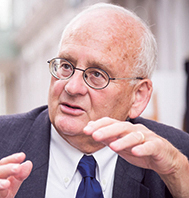 B
B y Hans de Wit and Philip G Altbach
y Hans de Wit and Philip G Altbach
The damage resulting from Russia’s war on Ukraine appears to include the loss of rationality among segments of the academic community in North America and Europe. In their rush to disengage from all things Russian, academics, universities, publishers, scientific organisations and governments are cutting ties with everything and everyone.
We have argued why engagement with Russian colleagues and knowledge of Russia are essential at this point in time. Within the academic community, colleagues are now advocating against, or even cancelling, courses dealing with Russian society, history and culture. This is precisely what should be avoided. Knowledge of Russia is more crucial than ever — not to mention that it is one of the world’s great civilisations, regardless of what Mr Vladimir Putin is doing to it today.
While it is difficult to make sense of public opinion in Putin’s increasingly authoritarian Russia, much of the Russian academic community opposes the war and values international relationships.
Thousands of Russian academics and intellectuals have left the country in protest and despair. Several have publicly resigned from their positions – risking jail or worse. Some 4,000 members of the academic community at Moscow State University, Russia’s most prestigious institution, signed an anti-war petition.
According to vice-rector of Russia’s National Research University Higher School of Economics Maria Yudkevich’s history of internationalisation of Russian higher education, since the early 1990s contacts between Russian researchers and their foreign colleagues have grown substantially, resulting in joint projects and publications, and over the course of the last decade, the integration of Russian science into the international community has become even stronger.
She writes in the 2022 Handbook of International Higher Education: “During various periods in history, higher education and science in Russia have been connected to the international community in different ways. The situation moved from close ties to a policy of almost complete autonomy and isolation, from cooperation and integration to a quest for a national identity of its own place on the global academic market.”
Russia is entering a new phase of isolation and a quest for national identity at political and institutional levels, but, for the sake of Russian — and global — higher education, personal academic ties and knowledge development that took decades to build should not be completely dismantled.
While ending relationships with Russian institutions linked to the Putin regime — and this includes all of the universities whose rectors have signed a pro-war declaration, some under duress — is a necessity, similarly boycotting all individuals and some NGOs is not justified and indeed harms brave individuals who are trying, under the most difficult and dangerous of circumstances, to carry on with their research and maintain international collaboration.
Overreactions
We have seen efforts and policies by several Western academics and publishers that aim to keep Russian academics from publishing in journals and books. We have concrete examples of Russian colleagues, outside of Russia, who were informed by their academic editors and publishers that their contributions would no longer be welcome just because they are Russian.
We know of scholars who have left Russia and were offered jobs at universities in other countries on the condition that they changed their nationality. Russian students whom we know have been accepted for doctoral studies abroad are now struggling not only to leave Russia but also to get an entry visa to the country of their host institution.
In essence, what these individuals face is completely in line with Putin’s current policy of forcing Russian academics to refrain from publishing and attending conferences internationally.
Academic freedom is the highest among academic values. It is gone in Putin’s Russia. We should not join in this political extremism.
The present and future
For now, the global academic community needs to take a step back and carefully consider how to react appropriately to the crisis. Instead of cutting off Russian academics and distancing ourselves from Russian culture, we should do the exact opposite.
Russians who are not involved with the Putin regime or who oppose it, among them the many who have left Russia and numerous others who are unable to do so, need our support and continued cooperation, similar to the support currently extended to the higher education system and community in Ukraine.
We agree with the four Ukrainian academics who wrote in a recent opinion article that “it is wrong to pretend that Russians who publicly condemn Putin’s regime face anywhere near the dangers that Ukrainian academics now encounter daily; they should not be united in one basket. While Russians and Belarusians face domestic repression, Ukrainians are fleeing shelling, bombing, killing and complete destruction of their homes and cities; victims of aggression should be prioritised.”
We also agree with them that “the reputations of these [Russian] institutions and individuals [those who signed a letter of support for the invasion] will forever be stained by this failure as public intellectuals and public platforms to defend the universal values of democracy, peace and academic integrity”. But in our opinion, this must not lead to isolation of those — Russian or others — who are in agreement with these universal values.
Philip G Altbachis research professor and distinguished fellow and Hans de Wit is professor emeritus and distinguished fellow, both at the Center for International Higher Education, Boston College, United States.
This article has been republished with permission from www.universityworldnews.com.